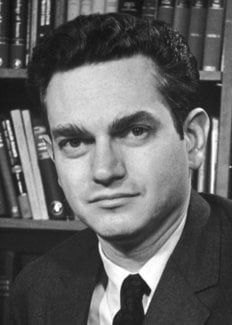Marshall W. Nirenberg
Biographical

Marshall Warren Nirenberg was born in New York City on April 10th, 1927, the son of Harry and Minerva Nirenberg. The family moved to Orlando, Florida in 1939. He early developed an interest in biology. In 1948 he received a B. Sc. degree, and in 1952, a M. Sc. degree in Zoology from the University of Florida at Gainesville. His dissertation for the Master’s thesis was an ecological and taxonomic study of caddis flies (Trichoptera).
During this period he became interested in biochemistry. He continued studies in this field at the University of Michigan, Ann Arbor, and in 1957 received the Ph. D. degree from the Department of Biological Chemistry. Nirenberg’s thesis, performed under the guidance of Dr. James Hogg, was a study of a permease for hexose transport in ascites tumor cells.
From 1957 to 1959 he obtained postdoctoral training with DeWitt Stetten Jr., and with William Jakoby at the National Institutes of Health as a fellow of the American Cancer society. During the next year he held a Public Health Service Fellowship and in 1960 became a research biochemist in the Section of Metabolic Enzymes, headed by Dr. Gordon Tompkins, at the National Institutes of Health.
In 1959 he began to study the steps that relate DNA, RNA and protein. These investigations led to the demonstration with H. Matthaei that messenger RNA is required for protein synthesis and that synthetic messenger RNA preparations can be used to decipher various aspects of the genetic code.
In 1962 he became head of the Section of Biochemical Genetics at the National Institutes of Health.
Nirenberg holds honorary degrees from the University of Michigan, Yale University, University of Chicago, University of Windsor (Ontario) and Harvard University. Other honours include: The Molecular Biology Award, National Academy of Sciences, 1962; Paul Lewis Award in Enzyme Chemistry, American Chemical Society, 1964; The National Medal of Science, 1965; The Research Corporation Award, 1966; the Hildebrand Award, 1966; the Gairdner Foundation Award of Merit, 1967; The Prix Charles Leopold Meyer, French Academy of Sciences, 1967; the Joseph Priestly Award, 1968; and the Franklin Medal, 1968. The Louisa Gross Horwitz Prize, Columbia University, and the Lasker Award were shared with H. G. Khorana in 1968. He is a member of the American Academy of Arts and Sciences and the National Academy of Sciences.
He was married in 1961 to Perola Zaltzman, a chemist from the University of Brazil, Rio de Janeiro. She is now a biochemist at the National Institutes of Health.
This autobiography/biography was written at the time of the award and later published in the book series Les Prix Nobel/ Nobel Lectures/The Nobel Prizes. The information is sometimes updated with an addendum submitted by the Laureate.
Marshall W. Nirenberg died on 15 January, 2010.
Nobel Prizes and laureates
Six prizes were awarded for achievements that have conferred the greatest benefit to humankind. The 12 laureates' work and discoveries range from proteins' structures and machine learning to fighting for a world free of nuclear weapons.
See them all presented here.
